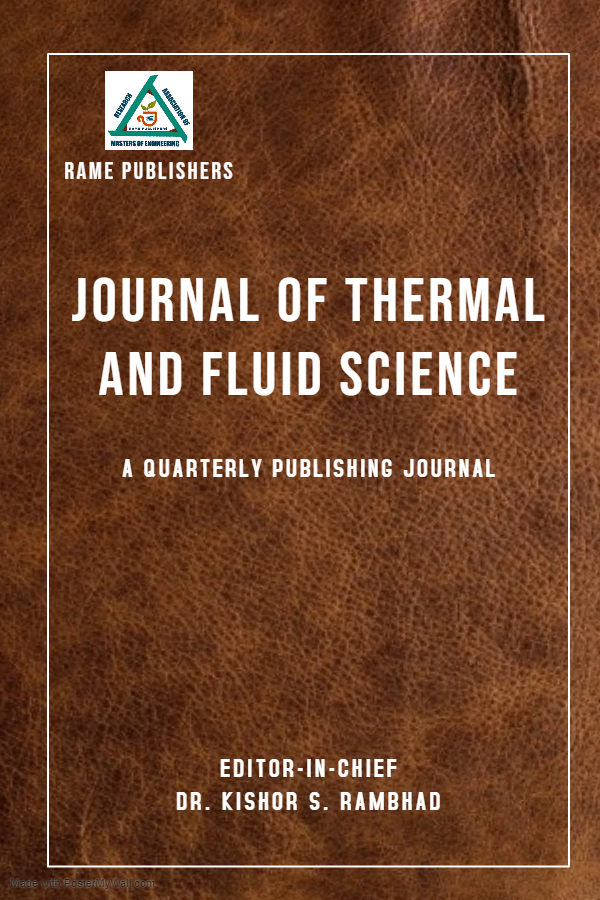Review of Supersonic Intake buzz, problems associated and possible solutions
Neeraj Kumar
Journal of Thermal and Fluid Science
Volume 3: Issue 1, March 2022, pp 1-6
Author's Information
Neeraj Kumar1
Corresponding Author
1Department of Aerospace Engineering, Defence Institute of Advanced Technology, Girinagar, Pune - 411 025, Maharashtra, India, India
neeraj_maero21@diat.ac.in
Abstract:-
Supersonic intake buzz is a type of shock oscillation that could occur at any supersonic inlet of an aircraft and which can alter the mass flow and pressure at inlet. It may lead to combustion instability also. A lot of experiments have been performed to understand the buzz characteristics while visualizing the flow characteristics through flow visualization techniques. Also, there have been a great effort and research to understand the supersonic buzz phenomenon through numerical simulation with the help of computational software packages. There could be different parameters affecting the buzz. Some of them was discovered by the researchers all over the world. Intake buzz distortion get substantially affected by change in angle of attack. Decrease in throttle area was also found to produce prominent effect on buzz by increasing its dominant frequency. The suppression of buzz has become a topic of active research. The suppression of buzz can help in increasing the efficiency of supersonic inlet and efficient compression, so can result in benefit of increasing the economic output and reducing the fuel consumption. Intake performance was found to be increased with small cowl deflection and by the use of buzz predictor and margin controller. Buzz could be controlled by deflecting the air in an advantageous way and generating a weaker gradient at inlet lip.Index Terms:-
Supersonic, inlet, buzz, shock, aircraft, experiment, numerical simulations, ramjet.REFERENCES
- Das S, Prasad JK. Cowl Deflection Angle in a Supersonic Air Intake. Defence Science Journal, Vol. 59, No. 2, March 2009, pp. 99-105
Crossref - Farokhi S. Aircraft propulsion, Wiley (2014)
Online - Seddon J, Goldsmith EL. Intake Aerodynamics. AIAA education series. Blackwell Science, 1999
Online - Trapier S, Duveau P, Deck S. Experimental Study of Supersonic Inlet Buzz. AIAA Journal. Vol 44, No. 10, October 2006.
Crossref - Fisher SA, Neale MC, Brooks AJ. On the sub-critical of variable ramp intakes at Mach numbers around 2. ARCR & RM. (1951) 3711
Online - Chima RV. Analysis of Buzz in a Supersonic Inlet. NASA/TM—2012-217612.
Online - Soltani MR, Farahani M, Kaji MH Asgari. An experimental study of buzz instability in an axisymmetric supersonic inlet. Scientia Iranica B (2011) 18 (2), 241–249.
Crossref - Lee HJ, Park TH, Jeung IS, Choi JY. Study on the Buzz Characteristics of Supersonic Air Intake at Mach 2.5. Journal of the Korean Society for Aeronautical & Space Sciences. May 2007.
Crossref - Dailey CL. Supersonic Diffuser Instability. Journal of the Aeronautical Sciences, Vol. 22, No. 11, 1955, pp. 733 – 749
Crossref - Ferri A, Nucci RM . The origin of aerodynamic instability of supersonic inlets at subcritical conditions.(1951) NACA RM-L50K30.
Online - Tanaka N, Mizukaki T. Visualization of unsteady behavior of shock waves around supersonic intake installed in shock tunnel. In: 28th International congress of the aeronautical sciences (ICAS) (2012)
Online - Suryanarayana GK, Dubey R.Image analyses of supersonic air-intake buzz and control by natural ventilation. Journal of Visualization. (2017) 20:711–727.
Crossref - Suryanarayana GK. Aerodynamic drag reduction of bluff bodies - application of natural ventilation. Lambert Academic Publishers, Cologne (2009). ISBN 978-3-8383-1103-6
Online - Jungclaus G, Krohn EO. DEVICE PREVENTING BUZZ IN SUPERSONIC INTAKES OF AIR-BREATHING REACTION ENGINES, PARTICULARLY, RAMJET ENGINES. United States patent, Patent no-4502651
Online - Sivakumar R, Babu V. Numerical Simulations of Flow in a 3-D Supersonic Intake at High Mach Numbers. Defence Science Journal, Vol. 56, No. 4, October 2006, pp. 465-476
Crossref - Yeom HW, Sung HG, Yang V. A Numerical Analysis of Supersonic Intake Buzz in an Axisymmetric Ramjet Engine. Int’l J. of Aeronautical & Space Sci. 16(2), 165–176 (2015).
Crossref - Zhu J, Luo W, Wei Y, Yan C, You Y. Acoustic Modeling and Vibration Characteristics of Supersonic Inlet Buzz. Energies 2020, 13(8), 2018.
Crossref - James JK, Suryan A, Kim HD. Buzz characteristics and separation bubble dynamics in supersonic intake. Aerospace Science and Technology 115 (2021) 106795.
Crossref - Sekar KR, Karthick SK, Jegadheeswaran S, Kannan R. On the unsteady throttling dynamics and scaling analysis in a typical hypersonic inlet-isolator flow. Phys. Fluids (2020)
Crossref - Soltani MR, Abedi M, Askari R. Numerical Simulation of Mixed Compression Intake Buzz. Proceedings of the ASME 2017 International Mechanical Engineering Congress and Exposition. IMECE2017-71680
Crossref - Yamamoto J, Kojima Y, Kameda M, Watanabe Y, Hashimoto A, Aoyama T. Prediction of the onset of supersonic inlet buzz. Aerospace Science and Technology (2019).
Crossref - Namkoung H-J, Hong W, Kim J-M, Yi J, Kim C. Effects of Angles of Attack and Throttling Conditions on Supersonic Inlet Buzz. Int’l J. of Aeronautical & Space Sci. 13(3), 296–306 (2012).
Crossref - Lu P-J, Jain L-T. Numerical Investigation of Inlet Buzz Flow. Journal of Propulsion and Power, Vol 14(1), Jan-Feb (1998). DOI: 10.2514/2.5254
Crossref - Park I-S, Ananthkrishnan N, Tahk MJ, Vineeth CS, Gupta NK.Low-order model for buzz oscillations in the intake of a ramjet engine. J Propulsion Power 27(2):503–506
Crossref - Trapier S, Deck S, Duveau P. Delayed detached simulation and analysis of supersonic intake buzz. AIAA J 46 (1):118-131
Crossref - Shi X, Chang J-T, Bao W, Yu D, Li B. Supersonic inlet buzz margin control of ducted rockets. J. Aerospace Engineering Proc. IMechE Vol. 224
Crossref
To view full paper, Download here
To View Full Paper
For authors
Author's guidelines Publication Ethics Publication Policies Artical Processing Charges Call for paper Frequently Asked Questions(FAQS) View All Volumes and IssuesPublishing with




